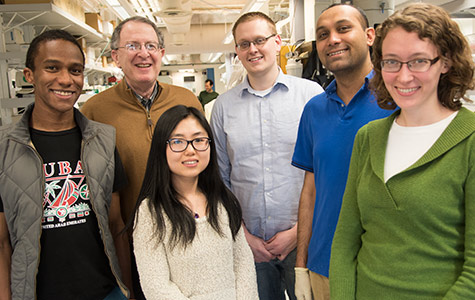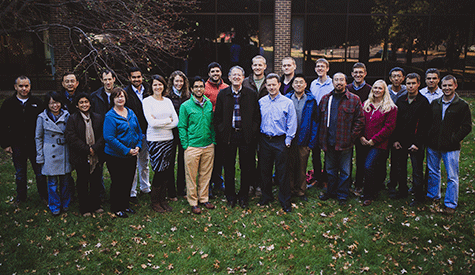
Jeffrey I. Gordon, MD, director of the Center for Genome Sciences & Systems Biology at Washington University School of Medicine in St. Louis, is a recipient of the 2015 Keio Medical Science Prize.
The prize, awarded by Keio University in Tokyo, recognizes scientists who have made outstanding and creative contributions to medicine or the life sciences, for the benefit of humankind.
Gordon is being honored for his pioneering role in establishing a field of research devoted to the human microbiome. His own studies have linked the community of microbes in the gut to good health and disease, providing a new and expanded perspective of the body as a tapestry of interacting microbial and human parts.
Gordon, also the Dr. Robert J. Glaser Distinguished University Professor, will share the prize with Yoshinori Ohsumi, PhD, of the Frontier Research Center at the Tokyo Institute of Technology. Ohsumi is being recognized for his work in uncovering the molecular underpinnings of autophagy, a process by which cells normally degrade and recycle misshapen proteins and other debris. Neurodegenerative diseases and cancer have been associated with autophagy when the process goes awry.
Gordon and Ohsumi will be honored Nov. 25 at a ceremony in Tokyo.
Gordon’s research focuses on the tens of trillions of microbes that live in the gut, where they process foods and synthesize vitamins and nutrients that human cells can’t manage on their own.
Seminal studies by Gordon and graduate students in his lab have examined the gut microbiomes of infants, children and adults, including twins, living in different parts of the world with culturally distinct lifestyles.
To understand the workings of the gut microbiome, he and his students have developed methods for transferring gut microbial communities from these people – some of whom are healthy and others who suffer from obesity or malnutrition – into mice raised under sterile conditions.
The animals are fed the same or different diets as the microbe donors, helping the researchers decipher how gut microbial communities operate within their human hosts and how they can be manipulated to treat and ultimately prevent disease.
Research by Gordon and his students fundamentally has changed the understanding of two global health problems: obesity and childhood malnutrition. Their work has provided compelling evidence that dysfunctional gut microbiomes are an underlying cause of both disorders.
Gordon’s research points to new directions for solving the daunting problem of how to feed a rapidly growing human population with foods that improve nutrition in infants and children as well as adults. At a time when there is a pressing need to develop sustainable food systems that yield affordable and more nutritious foods, his studies indicate that diets should be designed with an understanding of how food ingredients interact with gut microbe communities. This knowledge promises to help guide choices about what new high-nutrient food sources to develop, how those foods should be processed, and how new nutritional guidelines can be developed.
“The spirit of openness, collaboration and inquisitiveness and the hands-on access to the latest technologies in places like the Center for Genome Sciences & Systems Biology provide a foundation for innovative interdisciplinary science that crosses traditional academic boundaries,” Gordon said. “Students are motivated and able to address pressing problems that need to be solved during this very challenging century for humanity.”
Gordon has been elected to the National Academy of Sciences, the National Institute of Medicine, the American Academy of Arts and Sciences and the American Philosophical Society. He also has received the Robert Koch Award (2013), which is widely regarded as the leading international prize in microbiology, the Passano Foundation’s Laureate Award (2014), the Dickson Prize in Medicine (2014) and, earlier this year, the King Faisal International Prize in Medicine.
Gordon said his greatest honor and good fortune as a scientist is that more than 120 “very gifted, creative, courageous and highly collaborative” PhD and MD/PhD students and postdoctoral fellows have chosen do their research in his lab. Gordon joined the faculty in 1981, after completing his clinical training in internal medicine and gastroenterology and a postdoctoral fellowship at the National Institutes of Health (NIH).

Through the years, Gordon has held various positions at the university, including as head of the Department of Molecular Biology and Pharmacology (now Developmental Biology) from 1991-2004. In 2004, he was named founding director of the university’s interdepartmental Center for Genome Sciences & Systems Biology.